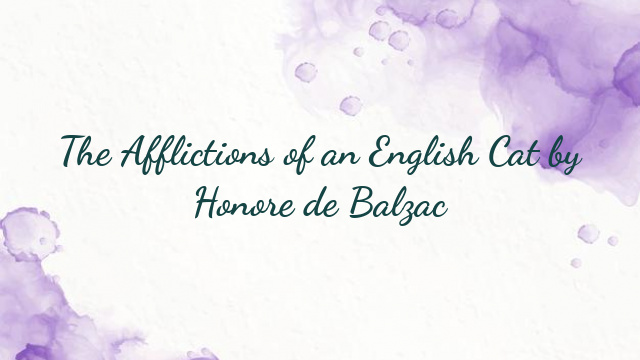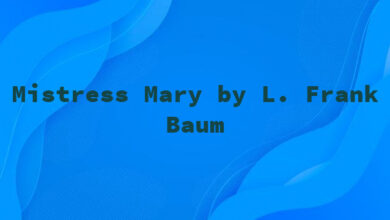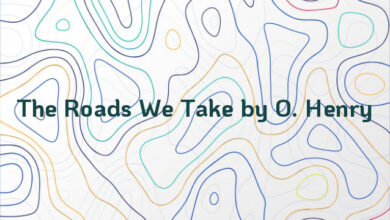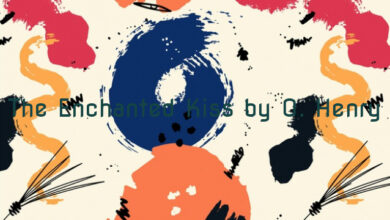
The Afflictions of an English Cat by Honore de Balzac
The Afflictions of an English Cat was published in the anthology, Lords of the Housetops: Thirteen Cat Tales (1921), Carl Van Vechten,translator and editor.
When the report of your first meeting arrived in London, O! French Animals, it caused the hearts of the friends of Animal Reform to beat faster. In my own humble experience, I have so many proofs of the superiority of Beasts over Man that in my character of an English Cat I see the occasion, long awaited, of publishing the story of my life, in order to show how my poor soul has been tortured by the hypocritical laws of England. On two occasions, already, some Mice, whom I have made a vow to respect since the bill passed by your august parliament, have taken me to Colburn’s, where, observing old ladies, spinsters of uncertain years, and even young married women, correcting proofs, I have asked myself why, having claws, I should not make use of them in a similar manner. One never knows what women think, especially the women who write, while a Cat, victim of English perfidy, is interested to say more than she thinks, and her profuseness may serve to compensate for what these ladies do not say. I am ambitious to be the Mrs. Inchbald of Cats and I beg you to have consideration for my noble efforts, O! French Cats, among whom has risen the noblest house of our race, that of Puss in Boots, eternal type of Advertiser, whom so many men have imitated but to whom no one has yet erected a monument.
I was born at the home of a parson in Catshire, near the little town of Miaulbury. My mother’s fecundity condemned nearly all her infants to a cruel fate, because, as you know, the cause of the maternal intemperance of English cats, who threaten to populate the whole world, has not yet been decided. Toms and females each insist it is due to their own amiability and respective virtues. But impertinent observers have remarked that Cats in England are required to be so boringly proper that this is their only distraction. Others pretend that herein may lie concealed great questions of commerce and politics, having to do with the English rule of India, but these matters are not for my paws to write of and I leave them to the Edinburgh-Review. I was not drowned with the others on account of the whiteness of my robe. Also I was named Beauty. Alas! the parson, who had a wife and eleven daughters, was too poor to keep me. An elderly female noticed that I had an affection for the parson’s Bible; I slept on it all the time, not because I was religious, but because it was the only clean spot I could find in the house. She believed, perhaps, that I belonged to the sect of sacred animals which had already furnished the she-ass of Balaam, and took me away with her. I was only two months old at this time. This old woman, who gave evenings for which she sent out cards inscribed Tea and Bible, tried to communicate to me the fatal science of the daughters of Eve. Her method, which consisted in delivering long lectures on personal dignity and on the obligations due the world, was a very successful one. In order to avoid these lectures one submitted to martyrdom.
One morning I, a poor little daughter of Nature, attracted by a bowl of cream, covered by a muffin, knocked the muffin off with my paw, and lapped the cream. Then in joy, and perhaps also on account of the weakness of my young organs, I delivered myself on the waxed floor to the imperious need which young Cats feel. Perceiving the proofs of what she called my intemperance and my faults of education, the old woman seized me and whipped me vigorously with a birchrod, protesting that she would make me a lady or she would abandon me.
“Permit me to give you a lesson in gentility,” she said. “Understand, Miss Beauty, that English Cats veil natural acts, which are opposed to the laws of English respectability, in the most profound mystery, and banish all that is improper, applying to the creature, as you have heard the Reverend Doctor Simpson say, the laws made by God for the creation. Have you ever seen the Earth behave itself indecently? Learn to suffer a thousand deaths rather than reveal your desires; in this suppression consists the virtue of the saints. The greatest privilege of Cats is to depart with the grace that characterizes your actions, and let no one know where you are going to make your little toilets. Thus you expose yourself only when you are beautiful. Deceived by appearances, everybody will take you for an angel. In the future when such a desire seizes you, look out of the window, give the impression that you desire to go for a walk, then run to a copse or to the gutter.”
As a simple Cat of good sense, I found much hypocrisy in this doctrine, but I was so young!
“And when I am in the gutter?” thought I, looking at the old woman.
“Once alone, and sure of not being seen by anybody, well, Beauty, you can sacrifice respectability with much more charm because you have been discreet in public. It is in the observance of this very precept that the perfection of the moral English shines the brightest: they occupy themselves exclusively with appearances, this world being, alas, only illusion and deception.”
I admit that these disguises were revolting to all my animal good sense, but on account of the whipping, it seemed preferable to understand that exterior propriety was all that was demanded of an English Cat. From this moment I accustomed myself to conceal the titbits that I loved under the bed. Nobody ever saw me eat, or drink, or make my toilet. I was regarded as the pearl of Cats.
Now I had occasion to observe those stupid men who are called savants. Among the doctors and others who were friends of my mistress, there was this Simpson, a fool, a son of a rich landowner, who was waiting for a bequest, and who, to deserve it, explained all animal actions by religious theories. He saw me one evening lapping milk from a saucer and complimented the old woman on the manner in which I had been bred, seeing me lick first the edges of the saucer and gradually diminish the circle of fluid.
“See,” he said, “how in saintly company all becomes perfection: Beauty understands eternity, because she describes the circle which is its emblem in lapping her milk.”
Conscience obliges me to state that the aversion of Cats to wetting their fur was the only reason for my fashion of drinking, but we will always be badly understood by the savants who are much more preoccupied in showing their own wit, than in discovering ours.
When the ladies or the gentlemen lifted me to pass their hands over my snowy back to make the sparks fly from my hair, the old woman remarked with pride, “You can hold her without having any fear for your dress; she is admirably well-bred!” Everybody said I was an angel; I was loaded with delicacies, but I assure you that I was profoundly bored. I was well aware of the fact that a young female Cat of the neighbourhood had run away with a Tom. This word, Tom, caused my soul a suffering which nothing could alleviate, not even the compliments I received, or rather that my mistress lavished on herself.
“Beauty is entirely moral; she is a little angel,” she said. “Although she is very beautiful she has the air of not knowing it. She never looks at anybody, which is the height of a fine aristocratic education. When she does look at anybody it is with that perfect indifference which we demand of our young girls, but which we obtain only with great difficulty. She never intrudes herself unless you call her; she never jumps on you with familiarity; nobody ever sees her eat, and certainly that monster of a Lord Byron would have adored her. Like a tried and true Englishwoman she loves tea, sits, gravely calm, while the Bible is being explained, and thinks badly of nobody, a fact which permits one to speak freely before her. She is simple, without affectation, and has no desire for jewels. Give her a ring and she will not keep it. Finally, she does not imitate the vulgarity of the hunter. She loves her home and remains there so perfectly tranquil that at times you would believe that she was a mechanical Cat made at Birmingham or Manchester, which is the ne plus ultra of the finest education.”
What these men and old women call education is the custom of dissimulating natural manners, and when they have completely depraved us they say that we are well-bred. One evening my mistress begged one of the young ladies to sing. When this girl went to the piano and began to sing I recognized at once an Irish melody that I had heard in my youth, and I remembered that I also was a musician. So I merged my voice with hers, but I received some raps on the head while she received compliments. I was revolted by this sovereign injustice and ran away to the garret. Sacred love of country! What a delicious night! I at last knew what the roof was. I heard Toms sing hymns to their mates, and these adorable elegies made me feel ashamed of the hypocrisies my mistress had forced upon me. Soon some of the Cats observed me and appeared to take offence at my presence, when a Tom with shaggy hair, a magnificent beard, and a fine figure, came to look at me and said to the company, “It’s only a child!” At these condescending words, I bounded about on the tiles, moving with that agility which distinguishes us; I fell on my paws in that flexible fashion which no other animal knows how to imitate in order to show that I was no child. But these calineries were a pure waste of time. “When will some one serenade me?” I asked myself. The aspect of these haughty Toms, their melodies, that the human voice could never hope to rival, had moved me profoundly, and were the cause of my inventing little lyrics that I sang on the stairs. But an event of tremendous importance was about to occur which tore me violently from this innocent life. I went to London with a niece of my mistress, a rich heiress who adored me, who kissed me, caressed me with a kind of madness, and who pleased me so much that I became attached to her, against all the habits of our race. We were never separated and I was able to observe the great world of London during the season. It was there that I studied the perversity of English manners, which have power even over the beasts, that I became acquainted with that cant which Byron cursed and of which I am the victim as well as he, but without having enjoyed my hours of leisure.
Arabella, my mistress, was a young person like many others in England; she was not sure whom she wanted for a husband. The absolute liberty that is permitted girls in choosing a husband drives them nearly crazy, especially when they recall that English custom does not sanction intimate conversation after marriage. I was far from dreaming that the London Cats had adopted this severity, that the English laws would be cruelly applied to me, and that I would be a victim of the court at the terrible Doctors’ Commons. Arabella was charming to all the men she met, and every one of them believed that he was going to marry this beautiful girl, but when an affair threatened to terminate in wedlock, she would find some pretext for a break, conduct which did not seem very respectable to me. “Marry a bow-legged man! Never!” she said of one. “As to that little fellow he is snub-nosed.” Men were all so much alike to me that I could not understand this uncertainty founded on purely physical differences.
Finally one day an old English Peer, seeing me, said to her: “You have a beautiful Cat. She resembles you. She is white, she is young, she should have a husband. Let me bring her a magnificent Angora that I have at home.”
Three days later the Peer brought in the handsomest Tom of the Peerage. Puff, with a black coat, had the most magnificent eyes, green and yellow, but cold and proud. The long silky hair of his tail, remarkable for its yellow rings, swept the carpet. Perhaps he came from the imperial house of Austria, because, as you see, he wore the colours. His manners were those of a Cat who had seen the court and the great world. His severity, in the matter of carrying himself, was so great that he would not scratch his head were anybody present. Puff had travelled on the continent. To sum up, he was so remarkably handsome that he had been, it was said, caressed by the Queen of England. Simple and naïve as I was I leaped at his neck to engage him in play, but he refused under the pretext that we were being watched. I then perceived that this English Cat Peer owed this forced and fictitious gravity that in England is called respectability to age and to intemperance at table. His weight, that men admired, interfered with his movements. Such was the true reason for his not responding to my pleasant advances. Calm and cold he sat on his unnamable, agitating his beard, looking at me and at times closing his eyes. In the society world of English Cats, Puff was the richest kind of catch for a Cat born at a parson’s. He had two valets in his service; he ate from Chinese porcelain, and he drank only black tea. He drove in a carriage in Hyde Park and had been to parliament.
My mistress kept him. Unknown to me, all the feline population of London learned that Miss Beauty from Catshire had married Puff, marked with the colours of Austria. During the night I heard a concert in the street. Accompanied by my lord, who, according to his taste, walked slowly, I descended. We found the Cats of the Peerage, who had come to congratulate me and to ask me to join their Ratophile Society. They explained that nothing was more common than running after Rats and Mice. The words, shocking, vulgar, were constantly on their lips. To conclude, they had formed, for the glory of the country, a Temperance Society. A few nights later my lord and I went on the roof of Almack’s to hear a grey Cat speak on the subject. In his exhortation, which was constantly supported by cries of “Hear! Hear!” he proved that Saint Paul in writing about charity had the Cats of England in mind. It was then the special duty of the English, who could go from one end of the world to the other on their ships without fear of the sea, to spread the principles of the morale ratophile. As a matter of fact English Cats were already preaching the doctrines of the Society, based on the hygienic discoveries of science. When Rats and Mice were dissected little distinction could be found between them and Cats; the oppression of one race by the other then was opposed to the Laws of Beasts, which are stronger even than the Laws of Men. “They are our brothers,” he continued. And he painted such a vivid picture of the suffering of a Rat in the jaws of a Cat that I burst into tears.
Observing that I was deceived by this speech, Lord Puff confided to me that England expected to do an immense trade in Rats and Mice; that if the Cats would eat no more, Rats would be England’s best product; that there was always a practical reason concealed behind English morality; and that the alliance between morality and trade was the only alliance on which England really counted.
Puff appeared to me to be too good a politician ever to make a satisfactory husband.
A country Cat made the observation that on the continent, especially at Paris, near the fortifications, Tom Cats were sacrificed daily by the Catholics. Somebody interrupted with the cry of “Question!” Added to these cruel executions was the frightful slander of passing the brave animals off for Rabbits, a lie and a barbarity which he attributed to an ignorance of the true Anglican religion which did not permit lying and cheating except in the government, foreign affairs, and the cabinet.
He was treated as a radical and a dreamer. “We are here in the interests of the Cats of England, not in those of continental Cats!” cried a fiery Tory Tom. Puff went to sleep. Just as the assembly was breaking up a young Cat from the French embassy, whose accent proclaimed his nationality, addressed me these delicious words:
“Dear Beauty, it will be an eternity before Nature forms another Cat as perfect as you. The cashmere of Persia and the Indies is like camel’s hair when it is compared to your fine and brilliant silk. You exhale a perfume which is the concentrated essence of the felicity of the angels, an odour I have detected in the salon of the Prince de Talleyrand, which I left to come to this stupid meeting. The fire of your eyes illuminates the night! Your ears would be entirely perfect if they would listen to my supplications. There is not a rose in England as rose as the rose flesh which borders your little rose mouth. A fisherman would search in vain in the depths of Ormus for pearls of the quality of your teeth. Your dear face, fine and gracious, is the loveliest that England has produced. Near to your celestial robe the snow of the Alps would seem to be red. Ah! those coats which are only to be seen in your fogs! Softly and gracefully your paws bear your body which is the culmination of the miracles of creation, but your tail, the subtle interpreter of the beating of your heart, surpasses it. Yes! never was there such an exquisite curve, more correct roundness. No Cat ever moved more delicately. Come away from this old fool of a Puff, who sleeps like an English Peer in parliament, who besides is a scoundrel who has sold himself to the Whigs, and who, owing to a too long sojourn at Bengal, has lost everything that can please a Cat.”
Then, without having the air of looking at him, I took in the appearance of this charming French Tom. He was a careless little rogue and not in any respect like an English Cat. His cavalier manner as well as his way of shaking his ear stamped him as a gay bachelor without a care. I avow that I was weary of the solemnity of English Cats, and of their purely practical propriety. Their respectability, especially, seemed ridiculous to me. The excessive naturalness of this badly groomed Cat surprised me in its violent contrast to all that I had seen in London. Besides my life was so strictly regulated, I knew so well what I had to count on for the rest of my days, that I welcomed the promise of the unexpected in the physiognomy of this French Cat. My whole life appeared insipid to me. I comprehended that I could live on the roofs with an amazing creature who came from that country where the inhabitants consoled themselves for the victories of the greatest English general by these words:
Malbrouk s’en va-t-en guerre, Mironton, ton, ton, MIRONTAINE! Nevertheless I awakened my lord, told him how late it was, and suggested that we ought to go in. I gave no sign of having listened to this declaration, and my apparent insensibility petrified Brisquet. He remained behind, more surprised than ever because he considered himself handsome. I learned later that it was an easy matter for him to seduce most Cats. I examined him through a corner of my eye: he ran away with little bounds, returned, leaping the width of the street, then jumped back again, like a French Cat in despair. A true Englishman would have been decent enough not to let me see how he felt.
Some days later my lord and I were stopping in the magnificent house of the old Peer; then I went in the carriage for a drive in Hyde Park. We ate only chicken bones, fishbones, cream, milk, and chocolate. However heating this diet might prove to others my so-called husband remained sober. He was respectable even in his treatment of me. Generally he slept from seven in the evening at the whist table on the knees of his Grace. On this account my soul received no satisfaction and I pined away. This condition was aggravated by a little affection of the intestines occasioned by pure herring oil (the Port Wine of English Cats), which Puff used, and which made me very ill. My mistress sent for a physician who had graduated at Edinburgh after having studied a long time in Paris. Having diagnosed my malady he promised my mistress that he would cure me the next day. He returned, as a matter of fact, and took an instrument of French manufacture out of his pocket. I felt a kind of fright on perceiving a barrel of white metal terminating in a slender tube. At the sight of this mechanism, which the doctor exhibited with satisfaction, Their Graces blushed, became irritable, and muttered several fine sentiments about the dignity of the English: for instance that the Catholics of old England were more distinguished for their opinions of this infamous instrument than for their opinions of the Bible. The Duke added that at Paris the French unblushingly made an exhibition of it in their national theatre in a comedy by Molière, but that in London a watchman would not dare pronounce its name.
“Give her some calomel.”
“But Your Grace would kill her!” cried the doctor.
“The French can do as they like,” replied His Grace. “I do not know, no more do you, what would happen if this degrading instrument were employed, but what I do know is that a true English physician should cure his patients only with the old English remedies.”
This physician, who was beginning to make a big reputation, lost all his practice in the great world. Another doctor was called in, who asked me some improper questions about Puff, and who informed me that the real device of the English was: Dieu et mon droit congugal!
One night I heard the voice of the French Cat in the street. Nobody could see us; I climbed up the chimney and, appearing on the housetop, cried, “In the rain-trough!” This response gave him wings; he was at my side in the twinkling of an eye. Would you believe that this French Cat had the audacity to take advantage of my exclamation. He cried, “Come to my arms,” daring to become familiar with me, a Cat of distinction, without knowing me better. I regarded him frigidly and, to give him a lesson, I told him that I belonged to the Temperance Society.
“I see, sir,” I said to him, “by your accent and by the looseness of your conversation, that you, like all Catholic Cats, are inclined to laugh and make sport, believing that confession will purge you, but in England we have another standard of morality. We are always respectable, even in our pleasures.”
This young Cat, struck by the majesty of English cant, listened to me with a kind of attention which made me hope I could convert him to Protestantism. He then told me in purple words that he would do anything I wished provided I would permit him to adore me. I looked at him without being able to reply because his very beautiful and splendid eyes sparkled like stars; they lighted the night. Made bold by my silence, he cried “Dear Minette!”
“What new indecency is this?” I demanded, being well aware that French Cats are very free in their references.
Brisquet assured me that on the continent everybody, even the King himself, said to his daughter, Ma petite Minette, to show his affection, that many of the prettiest and most aristocratic young wives called their husbands, Mon petit chat, even when they did not love them. If I wanted to please him I would call him, Mon petit homme! Then he raised his paws with infinite grace. Thoroughly frightened I ran away. Brisquet was so happy that he sang Rule Britannia, and the next day his dear voice hummed again in my ears.
“Ah! you also are in love, dear Beauty,” my mistress said to me, observing me extended on the carpet, the paws flat, the body in soft abandon, bathing in the poetry of my memories.
I was astonished that a woman should show so much intelligence, and so, raising my dorsal spine, I began to rub up against her legs and to purr lovingly with the deepest chords of my contralto voice.
While my mistress was scratching my head and caressing me and while I was looking at her tenderly a scene occurred in Bond Street which had terrible results for me.
Puck, a nephew of Puff’s, in line to succeed him and who, for the time being, lived in the barracks of the Life Guards, ran into my dear Brisquet. The sly Captain Puck complimented the attaché on his success with me, adding that I had resisted the most charming Toms in England. Brisquet, foolish, vain Frenchman that he was, responded that he would be happy to gain my attention, but that he had a horror of Cats who spoke to him of temperance, the Bible, etc.
“Oh!” said Puck, “she talks to you then?”
Dear French Brisquet thus became a victim of English diplomacy, but later he committed one of these impardonable faults which irritate all well-bred Cats in England. This little idiot was truly very inconsistent. Did he not bow to me in Hyde Park and try to talk with me familiarly as if we were well acquainted? I looked straight through him coldly and severely. The coachman seeing this Frenchman insult me slashed him with his whip. Brisquet was cut but not killed and he received the blow with such nonchalance, continuing to look at me, that I was absolutely fascinated. I loved him for the manner in which he took his punishment, seeing only me, feeling only the favour of my presence, conquering the natural inclination of Cats to flee at the slightest warning of hostility. He could not know that I came near dying, in spite of my apparent coldness. From that moment I made up my mind to elope. That evening, on the roof, I threw myself tremblingly into his arms.
“My dear,” I asked him, “have you the capital necessary to pay damages to old Puff?”
“I have no other capital,” replied the French Cat, laughing, “than the hairs of my moustache, my four paws, and this tail.” Then he swept the gutter with a proud gesture.
“Not any capital,” I cried, “but then you are only an adventurer, my dear!”
“I love adventures,” he said to me tenderly. “In France it is the custom to fight a duel in the circumstances to which you allude. French Cats have recourse to their claws and not to their gold.”
“Poor country,” I said to him, “and why does it send beasts so denuded of capital to the foreign embassies?”
“That’s simple enough,” said Brisquet. “Our new government does not love money—at least it does not love its employees to have money. It only seeks intellectual capacity.”
Dear Brisquet answered me so lightly that I began to fear he was conceited.
“Love without money is nonsense,” I said. “While you were seeking food you would not occupy yourself with me, my dear.”
By way of response this charming Frenchman assured me that he was a direct descendant of Puss in Boots. Besides he had ninety-nine ways of borrowing money and we would have, he said, only a single way of spending it. To conclude, he knew music and could give lessons. In fact, he sang to me, in poignant tones, a national romance of his country, Au clair de la lune….
At this inopportune moment, when seduced by his reasoning, I had promised dear Brisquet to run away with him as soon as he could keep a wife comfortably, Puck appeared, followed by several other Cats.
“I am lost!” I cried.
The very next day, indeed, the bench of Doctors’ Commons was occupied by a procès-verbal in criminal conversation. Puff was deaf; his nephews took advantage of his weakness. Questioned by them, Puff said that at night I had flattered him by calling him, Mon petit homme! This was one of the most terrible things against me, because I could not explain where I had learned these words of love. The judge, without knowing it, was prejudiced against me, and I noted that he was in his second childhood. His lordship never suspected the low intrigues of which I was the victim. Many little Cats, who should have defended me against public opinion, swore that Puff was always asking for his angel, the joy of his eyes, his sweet Beauty! My own mother, come to London, refused to see me or to speak to me, saying that an English Cat should always be above suspicion, and that I had embittered her old age. Finally the servants testified against me. I then saw perfectly clearly how everybody lost his head in England. When it is a matter of a criminal conversation, all sentiment is dead; a mother is no longer a mother, a nurse wants to take back her milk, and all the Cats howl in the streets. But the most infamous thing of all was that my old attorney who, in his time, would believe in the innocence of the Queen of England, to whom I had confessed everything to the last detail, who had assured me that there was no reason to whip a Cat, and to whom, to prove my innocence, I avowed that I did not even know the meaning of the words, “criminal conversation” (he told me that the crime was so called precisely because one spoke so little while committing it), this attorney, bribed by Captain Puck, defended me so badly that my case appeared to be lost. Under these circumstances I went on the stand myself.
“My Lords,” I said, “I am an English Cat and I am innocent. What would be said of the justice of old England if….”
Hardly had I pronounced these words than I was interrupted by a murmur of voices, so strongly had the public been influenced by the Cat-Chronicle and by Puck’s friends.
“She questions the justice of old England which has created the jury!” cried some one.
“She wishes to explain to you, My Lords,” cried my adversary’s abominable lawyer, “that she went on the rooftop with a French Cat in order to convert him to the Anglican faith, when, as a matter of fact, she went there to learn how to say, Mon petit homme, in French, to her husband, to listen to the abominable principles of papism, and to learn to disregard the laws and customs of old England!”
Such piffle always drives an English audience wild. Therefore the words of Puck’s attorney were received with tumultuous applause. I was condemned at the age of twenty-six months, when I could prove that I still was ignorant of the very meaning of the word, Tom. But from all this I gathered that it was on account of such practices that Albion was called Old England.
I fell into a deep miscathropy which was caused less by my divorce than by the death of my dear Brisquet, whom Puck had had killed by a mob, fearing his vengeance. Also nothing made me more furious than to hear the loyalty of English Cats spoken of.
You see, O! French Animals, that in familiarizing ourselves with men, we borrow from them all their vices and bad institutions. Let us return to the wild life where we obey only our instincts, and where we do not find customs in conflict with the sacred wishes of Nature. At this moment I am writing a treatise on the abuse of the working classes of animals, in order to get them to pledge themselves to refrain from turning spits, to refuse to allow themselves to be harnessed to carriages, in order, to sum up, to teach them the means of protecting themselves against the oppression of the grand aristocracy. Although we are celebrated for our scribbling I believe that Miss Martineau would not repudiate me. You know that on the continent literature has become the haven of all Cats who protest against the immoral monopoly of marriage, who resist the tyranny of institutions, and who desire to encourage natural laws. I have omitted to tell you that, although Brisquet’s body was slashed with a wound in the back, the coroner, by an infamous hypocrisy, declared that he had poisoned himself with arsenic, as if so gay, so light-headed a Cat could have reflected long enough on the subject of life to conceive so serious an idea, and as if a Cat whom I loved could have the least desire to quit this existence! But with Marsh’s apparatus spots have been found on a plate.




